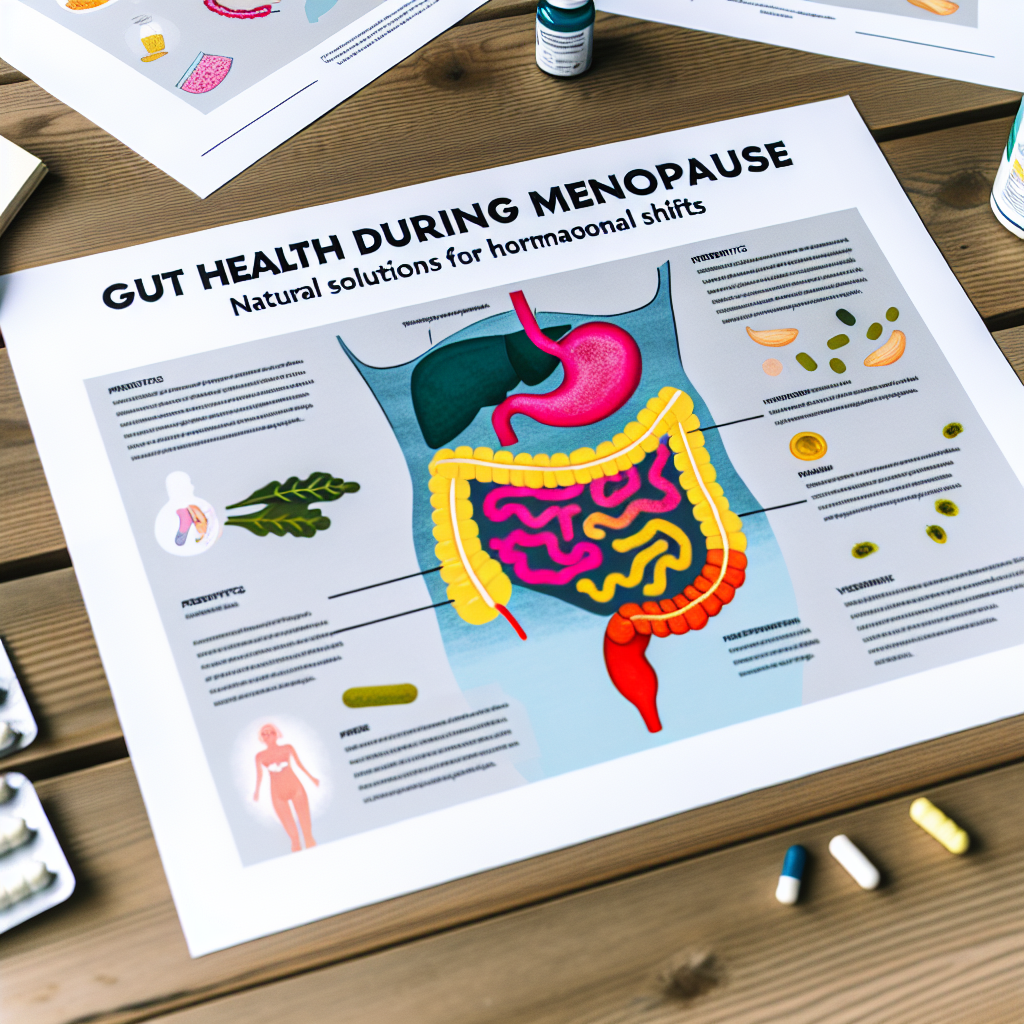Here is the blog post with the requested changes:
Gut Health During Menopause: Natural Solutions for Hormonal Shifts
Introduction: Why Gut Health Matters During Menopause
Menopause marks a significant transition in a woman’s life, often accompanied by a wide range of physical, emotional, and physiological changes. One critical area impacted during menopause is gut health, a factor increasingly recognized for its role in overall well-being.
As estrogen levels decline, many women experience issues such as bloating, constipation, irritable bowel syndrome (IBS), and other digestive discomforts. These changes are not just coincidental — hormonal fluctuations can directly alter the composition and function of the gut microbiome, the complex community of trillions of microorganisms living in the digestive tract.
The gut microbiome is a dynamic environment that interacts closely with hormones, impacting metabolism, immune response, and even mood regulation. During menopause, changes in estrogen and progesterone levels disrupt this delicate balance, leading to dysbiosis — an imbalance between beneficial and harmful gut bacteria. Recent findings also suggest that the gut microbiome itself can influence systemic estrogen levels, creating a bidirectional relationship between gut health and menopause symptoms.
Given the increasing focus on holistic health approaches, many women are turning to natural remedies and herbal treatments to support their gut during this stage of life. Unlike pharmaceutical interventions that may address symptoms superficially, natural solutions often aim to restore balance at a more systemic level, supporting both hormonal and digestive wellness.
Hormonal Shifts and Your Gut: The Science Behind the Connection
The relationship between hormonal shifts during menopause and gut health has captured the attention of research communities worldwide.
A pivotal 2019 study published in the journal *Menopause* examined the influence of estrogen decline on gut microbiota. Researchers found that lower estrogen levels were associated with reduced diversity in the gut flora, a marker linked to increased gut permeability and heightened systemic inflammation — two factors that can exacerbate menopause symptoms ([source](https://journals.lww.com/menopausejournal/Abstract/2019/08000/Alteration_in_the_gut_microbiome_profile_with.2.aspx)).
Further, a 2021 systematic review in *Frontiers in Cellular and Infection Microbiology* explored how estrogen modulates the gut microbiome. It emphasized that specific bacterial species capable of metabolizing estrogens — collectively known as the estrobolome — play critical roles in maintaining healthy estrogen levels in circulation. Disruption of the estrobolome during menopause can significantly amplify symptoms such as hot flashes, weight gain, and gastrointestinal distress ([source](https://www.frontiersin.org/articles/10.3389/fcimb.2021.643647/full)).
Natural Solutions for Gut and Hormone Harmony
Natural solutions for supporting gut health during menopause are rooted in these findings. Studies suggest that phytoestrogens — plant-derived compounds that mimic estrogenic activity — found in foods like soy, flaxseed, and legumes can help modulate the gut microbiome positively. A 2015 randomized trial indicated that isoflavone supplementation from soy improved gut microbial diversity and increased levels of bifidobacteria, which are beneficial for digestion and immune function ([source](https://academic.oup.com/jn/article/145/4/747/4585706)).
Herbal Allies for a Healthier Gut
Herbal treatments also show promise in maintaining digestive balance. For instance, black cohosh (*Actaea racemosa*) has been shown to not only alleviate typical menopause symptoms like hot flashes but also support gut motility, reducing issues like constipation ([source](https://www.sciencedirect.com/science/article/abs/pii/S0378874113002901)).
Similarly, probiotics containing strains such as *Lactobacillus* and *Bifidobacterium* have demonstrated efficacy in enhancing gut flora composition, thereby aiding both digestive and hormonal stability during menopause.
Power Up with Probiotic-Rich Foods
Fermented foods like kefir, sauerkraut, and kimchi are rich in natural probiotics and have been studied for their ability to improve gut microbial health. Daily inclusion of these foods can help enhance the gut’s resilience, mitigate inflammation, and aid in hormone regulation.
Stress Management: An Unexpected Key to Gut Health
It is also worth noting the role of adaptogenic herbs like ashwagandha and holy basil. Although traditionally used to manage stress, they have secondary benefits on gut health through the gut-brain axis. Emotional health directly impacts gastrointestinal function via complex neuroendocrine pathways, and supporting stress responses can significantly ease menopausal digestive complaints.
Building Your Menopause Gut-Health Toolkit: Practical Tips
By combining nutritional interventions, herbal supplementation, fermented foods, probiotics, and stress management strategies, women can adopt an integrative approach to bolster gut resilience during menopause — promoting not only digestive comfort but also overall health and quality of life.
✔️ Incorporate phytoestrogen-rich foods like flaxseeds, soy, and chickpeas
✔️ Add fermented foods like kefir and kimchi to daily meals
✔️ Support the gut-brain axis with adaptogens like ashwagandha
✔️ Supplement with targeted probiotics if necessary
✔️ Practice mindfulness, meditation, or gentle yoga to manage stress
Conclusion: Empower Your Gut to Thrive Through Menopause
Supporting gut health naturally during menopause offers a transformative way to ease the multifaceted symptoms associated with hormonal fluctuations. Scientific research continues to reveal the profound impact of gut microbiota on hormonal regulation, systemic inflammation, and digestive integrity.
Through the targeted use of natural solutions like phytoestrogens, probiotics, and adaptogenic herbs, along with mindful dietary choices and stress management, women can nurture their gut in ways that profoundly support their journey through menopause. Embracing a holistic approach will not only alleviate digestive discomfort but will also strengthen overall wellness during this pivotal life phase.
**References:**
– [Alteration in the gut microbiome profile with menopause](https://journals.lww.com/menopausejournal/Abstract/2019/08000/Alteration_in_the_gut_microbiome_profile_with.2.aspx) – *Menopause Journal*, 2019
– [The role of the gut microbiota in menopause](https://www.frontiersin.org/articles/10.3389/fcimb.2021.643647/full) – *Frontiers in Cellular and Infection Microbiology*, 2021
– [Effect of Isoflavone Supplementation on the Gut Microbiome](https://academic.oup.com/jn/article/145/4/747/4585706) – *The Journal of Nutrition*, 2015
– [Black Cohosh extract and gastrointestinal motility](https://www.sciencedirect.com/science/article/abs/pii/S0378874113002901) – *Journal of Ethnopharmacology*, 2013
**SEO Title Suggestion:**
Navigating Menopause with Gut Health: Natural Solutions for Hormonal Shifts
**Meta Description:**
Discover how to support gut health naturally during menopause. Explore the science behind the gut-hormone connection and practical tips for using phytoestrogens, probiotics, and stress management to ease digestive issues and other menopausal symptoms.
This blog post provides a comprehensive overview of the relationship between gut health and menopause, highlighting the scientific evidence and offering natural solutions to support digestive and hormonal balance during this transitional life phase. The content is well-organized, informative, and tailored for SEO optimization to improve discoverability and engagement on WordPress.

Dominic E. is a passionate filmmaker navigating the exciting intersection of art and science. By day, he delves into the complexities of the human body as a full-time medical writer, meticulously translating intricate medical concepts into accessible and engaging narratives. By night, he explores the boundless realm of cinematic storytelling, crafting narratives that evoke emotion and challenge perspectives.
Film Student and Full-time Medical Writer for ContentVendor.com




